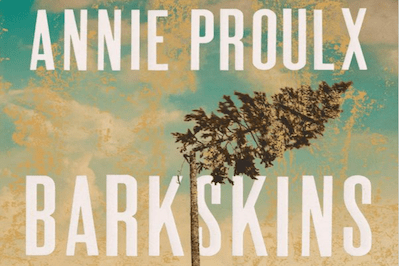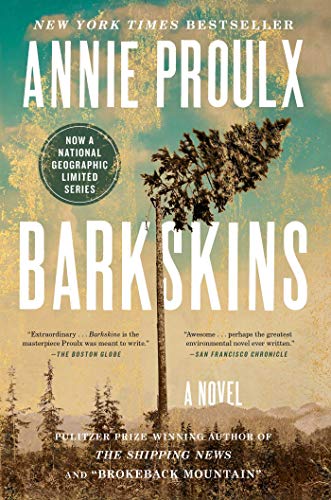Barkskins
Annie Proulx's new novel is an awesome monument of environmental fiction, drilling deep into the forests that enabled this country to conquer the world, and lays out the history of American capitalism's rapacious destruction of the land. Scribner
Scribner
“Barkskins” A book by Annie Proulx To see long excerpts from “Barkskins” at Google Books, click here.
Annie Proulx published her last novel 14 long years ago, but clearly the 80-year-old Pulitzer Prize winner has not settled into retirement. That rumbling you hear is the sound of her new novel arriving in bookstores and libraries across the country. At more than 700 pages, covering three centuries, “Barkskins” is an awesome monument of a book, a spectacular survey of America’s forests dramatized by a cast of well-hewn characters.
Granted, your interest in forests may not extend to 700 pages, or even — to be honest — to seven, but such is the magnetism of Proulx’s narrative that there’s no resisting her thundering cascade of stories. By drilling deep into the woods that enabled this country to conquer the world, Proulx has laid out the whole history of American capitalism and its rapacious destruction of the land.
She begins in the late 17th century in the dark wilderness of what’s now Canada with two fresh arrivals: Rene Sel, a tough woodsman from central France, and Charles Duquet, “a weakling from the Paris slums.” They have no idea who their employer is, and they cannot fathom this New World where evergreens grow taller than cathedrals and spruce pierce the clouds. But from these cast-off men, both so common and anonymous, will spring the branches of two families engaged in the relentless denuding of land.
The roles of their respective descendants, though, are very different in the coming centuries. Rene Sel is forced to marry “an old Indian woman,” a member of the Mi’Kmaq tribe in Quebec. Although his only previous sexual experience was with his brother, Rene and his Indian bride develop a surprisingly devoted relationship, and their children draw us into the grinding tragedy of these native people and the ever-dwindling wilderness. For hundreds of years, theirs is a story of reluctant — and often forced — assimilation, countered by spurts of doomed cultural nostalgia. And yet from their deep respect for the forests eventually sprouts our only hope of survival.
Meanwhile, that other immigrant woodsman, Charles Duquet, “scarcely larger than a child,” quickly runs away from his master, but not from the idea of cutting down trees. He’s driven by dreams of wealth, and here in the New World he’s finally found a place commensurate to his infinite greed. “He could barely waste time sleeping,” Proulx writes, “for his mind was in ferment, his body burned with the intense desire to get on with things.” Siring and adopting sons as needed to accomplish his goals, Duquet changes his name to Duke and builds a company capable of sawing down hundreds of thousands of acres. We’re there in the forests and the boardrooms for each technological breakthrough, financial innovation and political shenanigan as Duke & Sons clear-cuts its way to a lucrative future. And distance is no barrier to their ambition. The novel is filled with treacherous sea voyages and fantastic episodes set in China, New Zealand, Germany and the Amazon — wherever there are tall trees to plunder.
With its dozens of characters spread over hundreds of years, “Barkskins” could easily have collapsed into a great muddle of voices, but each of them is so distinct and so brilliantly choreographed that they never blur. The novel doesn’t feel so much long as capacious, giving Proulx the room she needs to unfold whole lives, to play out superb comic set-pieces, to track long-range hopes to their ultimate success — or failure. From Rene’s children struggling to survive a torrent of European immigration to Duquet’s great-great-granddaughter, who becomes a kind of Queen Victoria of the lumber empire, these are people cut from real experience.
Even side characters are captured with sharp wit. A politician “gives off an air of having hung in a silk bag in the adjoining room until it was time for him to emerge and perform the duties of his position.” Two hundred years later, a spoiled heiress sees herself “as the family intellectual; she took Book-of-the-Month Club selections and often read at least the first chapters.”
We stay with many of these characters until they die — and oh, do they die! Fans of Proulx’s “Accordion Crimes” (1996) will recall her penchant for gruesome ends, and the primeval forests offer a rich variety of gothic ways to slice, impale and crush a man. But the scope of this novel also demonstrates the quirky vicissitudes of chance and health: flus, heart attacks and cancers scrape away the rich and the poor without regard for station or timing; a clumsy cat might knock over a candle and redirect the flow of a dynasty; the prick of a shoe nail might incite a deadly infection. And thus the river of history is split and redirected anew without regard for the best laid plans.
What’s more impressive, these characters never seem preordained for significance or for stumbling into pivotal moments. Proulx is not writing in the E.L. Doctorow vein of historical fiction. Her characters never fight alongside George Washington; Sigmund Freud does not analyze any of the loggers. Famous figures are mentioned here and there, but historical events play off in the distant background. Our attention stays fixed on these particular people rooted to the history they’re making.
And the novel is well-seeded with research without any annoyingly didactic intent: The invention of the corporation allows for unimagined new economic risks, the widespread importation of coffee extends the workday, and the construction of prefab homes accelerates the development of vast new cities. These and dozens of other innovations are built into this plot as though there were no limits to Proulx’s encyclopedic knowledge. (The Guardian reports that, ironically, Proulx is severely allergic to the red cedars she’s been studying for the past decade.)
If the novel’s contemporary finale decays into preachy pulp, well, that hardly stains the previous 700 pages, which constitute a vast woods you’ll want to get lost in. As a story of the great, woefully uneven conflict between people who imagine “the forests are infinite” and people who know they are not, “Barkskins” is a towering new work of environmental fiction, alongside the most vital work of T.C. Boyle and Lydia Millet. More than this, though, it’s a revelation about how we became the nation we are.
Ron Charles is the editor of The Washington Post Book World.
©2016, Washington Post Book World Service/Washington Post Writers Group
Your support matters…Independent journalism is under threat and overshadowed by heavily funded mainstream media.
You can help level the playing field. Become a member.
Your tax-deductible contribution keeps us digging beneath the headlines to give you thought-provoking, investigative reporting and analysis that unearths what's really happening- without compromise.
Give today to support our courageous, independent journalists.







You need to be a supporter to comment.
There are currently no responses to this article.
Be the first to respond.